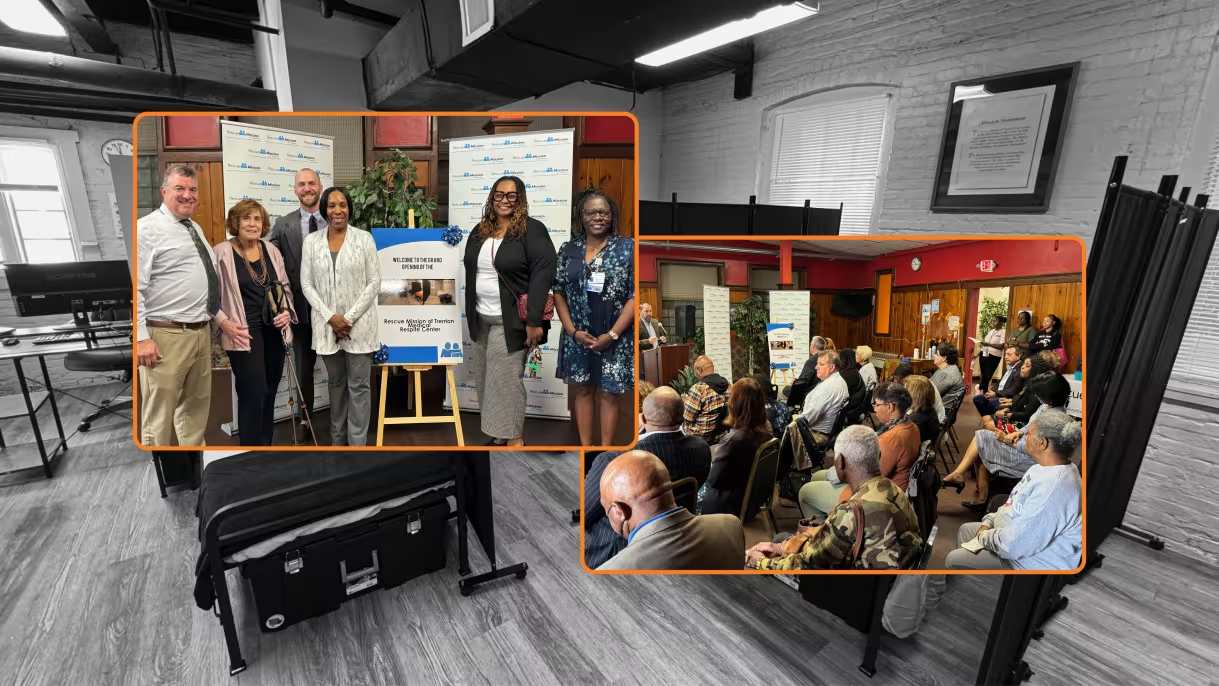

MPA Student Uses Internship to Help Improve Healthcare for Trenton’s Homeless
Ben Harris’s first job after earning his undergraduate degree was at the Erie Family Health Centers in Chicago, where he got to see firsthand the intersection of community and physical health. One of his mentors there was the chief clinical officer, David Buchanan, who studied the role of housing in healthcare.
“He basically showed me that supportive housing is equivalent to taking a medication,” Harris said. Harris grew fascinated by the role of community-based organizations and the strategies they used to increase their impact. This inspired him to continue his studies, first at the Booth School of Business at the University of Chicago, where he earned his MBA in 2023, and now at the Princeton School of Public and International Affairs, where he is a second-year MPA student.
Last winter, he saw a notice through the Princeton SPIA graduate office that the Trenton Rescue Mission (TRM) and the New Jersey Coalition to End Homelessness (NJCEH) were looking for a Princeton Social Impact Fellow to help them establish a medical respite center, a sort of halfway house for homeless people who have been discharged from the hospital but still aren’t well enough to return to the streets.
Social Impact Fellowships are collaborations among nonprofit organizations, campus partners, such as SPIA, and the Princeton Graduate School’s GradFUTURES professional development program. These fellowships offer graduate students immersive experiences through which they can apply their skills to meaningful projects that tackle societal challenges at the local, regional, national, and global levels. GradFUTURES continually develops opportunities to match student interests and skills.
Harris thought the project would be a chance to use the expertise he’d acquired in business school and get some practical experience in healthcare and social services. Over the course of nine months, he worked with NJCEH’s CEO, Connie Mercer, and her team to develop a business plan and a budget, set up operating protocols and a staffing model, and help fill in gaps in fundraising. The Trenton Rescue Mission Medical Respite Center opened on November 1.
Without medical respite, Harris said, “there’s no safe or clean space for homeless patients to go. If they remain in the hospital or institution, that’s not great healthcare either. That’s not where they belong, and it’s expensive. As Connie always says, they just need a home. They need someone to tend to their needs. They need to fully recuperate. And the options presented to them, the street or an institution, do not fulfill that.”
Experts estimate that hospital care for unhoused people costs $4,000 more per admission than it does for the general public, paid for by the community. Medical respite centers help alleviate those costs. The TRM Medical Respite Center is funded through state and county grants, but Harris plans to spend his remaining time at SPIA researching ways to diversity funding, including working with hospitals, insurance companies, and New Jersey Medicaid to make medical respite a reimbursable service.
The TRM Medical Respite Center currently has four beds; eventually, it will have eight. It’s equipped to provide case management and care coordination as well as basic medical clinical services, including medication and chronic disease management, wound care, and behavioral health assessments. The team had hoped to be able to help people who need antibiotics or liquid IVs, but they won’t be able to do that until the center is attached to a medical clinic.
“It’s small,” Harris said, “but I think it’s mighty, and you’ve got to start somewhere. It’s eight fewer people who will be on the streets.”
This is important now, he said, after last summer’s Supreme Court decision in Grants Pass v. Johnson, which allows cities to ban people from sleeping and camping in public places. This has already led to sweeps and clearing out of homeless encampments, an easy and quick way to address the problem, but not an especially humane one.
“It’s a very hard policy to swallow,” Harris said. “What’s particularly frustrating is that communities already have the resources to help homeless people, and there are proven solutions like medical respite. It’s a matter of whether we can build the political will and the capacity to build and scale those programs.”
Already other New Jersey communities have reached out to TRM to learn more about how they can build medical respite centers of their own.
“We would not have reached this finish line without the immense leadership and hard work of Ben,” Mercer said. “He was analytical, strategic, visionary, and, above all else, grounded in the dignity of our most vulnerable neighbors. At a time when so many communities in New Jersey are struggling to humanely respond to homelessness, his leadership has helped give Trenton a new reason to hope and believe that they can end homelessness.”
Harris is proud that the TRM center is setting an example for the rest of New Jersey. “It’s clearly tapped into a need across the state,” he said. “There was a need out there that had not been addressed. And now we’re starting to address it and communities are taking note of it. I feel tremendous about that.”

